By Michael Clements | Epoch Times.
Eighteen months after it was enacted, President Joe Biden credited the 2022 Bipartisan Safer Communities Act (BSCA) for “saving lives.”
“I am proud to have taken more executive action than any president in history to combat gun violence in America, and I will never stop fighting to get even more done,” President Biden said in a Jan. 5 statement.
“Congress must enact universal background checks, ban assault weapons and high-capacity magazines, end the gun industry’s immunity from liability, and pass a national red flag law.”
President Biden credited the enhanced background checks in the BSCA for denying “more than 500 illegal gun purchases by people under 21 years old who presented a danger to our communities.”
He has also touted the disbursement of $1.5 billion to schools to add safety measures, and an increase in prosecutions of gun dealers due to a “revised definition” in the BSCA.
Second Amendment advocates, on the other hand, say that the BSCA has done nothing but restrict the rights of law-abiding Americans.
Mark Oliva, managing director of public affairs for the National Shooting Sports Foundation, said the Biden administration has used the BSCA “as a launching point for executive overreach.”
He said the president has issued executive orders, promoted new laws, directed the Bureau of Alcohol, Tobacco, Firearms and Explosives (ATF) to write new rules, and changed legal definitions to get the gun control he wants.
“And that, of course, would be illegal. The executive branch cannot gin up or just miracle out of thin air their own criminal law,” Mr. Oliva told The Epoch Times.
White House officials didn’t respond to an email from The Epoch Times seeking comment for this story.
Federal officials said that violent crime involving firearms was on the rise, especially from 2019 to 2022 during the pandemic, and the BSCA was crafted to address the problem.
According to FBI crime statistics, violent crimes, including homicides, rape, aggravated assault, and robbery spiked during the pandemic.
Homicides increased from 14,678 in 2019 to 18,965 in 2020, according to FBI data. In 2022, they had reached 19,200 nationwide.

Many experts blame lockdowns, school closures, business shutdowns, and other pandemic-related issues for the increase.
In addition, the May 2020 death of George Floyd during an arrest by Minneapolis police officers sparked riots and calls to defund the police. Many of America’s largest cities heeded those calls, either cutting police department budgets or diverting funds to other programs.
This resulted in fewer officers on the streets and a hesitancy by some police officers to interact with citizens, out of concern over how the action might be portrayed in the media.

Those localized issues may have skewed the numbers, according to a research group.
A study by the Crime Prevention Research Center (CPRC) found that 2 percent of U.S. counties accounted for 56 percent of murders in 2020. The study, published in January 2023, showed that the vast majority of communities didn’t have a serious violent crime problem.
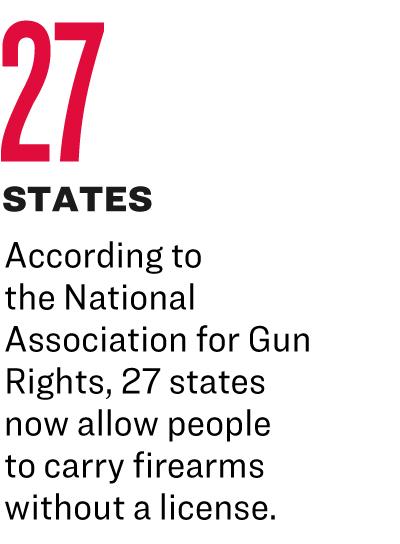
Homicides fell by an average of 14 percent nationally in the first nine months of 2023, compared to the year-earlier period, according to FBI data, although the agency says not all law enforcement agencies supplied data. And the homicide rate remains higher than pre-pandemic 2019.
The 2023 decrease is one of the statistics that the Biden administration hails as proof of the BSCA’s success.
“There’s more work to do, but we’re making real progress: there was a significant drop in crime in 2023—including one of the largest-ever yearly declines in homicides in history,” President Biden said in the Jan. 5 statement.
But, several factors other than the BSCA could have played a role, said Second Amendment rights advocate Alan Gottlieb, the founder and executive vice president of the Second Amendment Foundation.
He said that even before the BSCA was enacted, courts and local and state governments had been affirming and expanding gun rights. And, changes that had been made in the wake of the 2020 riots were being rolled back in some areas.
Many cities, including Chicago, New York, and Portland, Oregon, that had downsized their police department budgets, reversed course as crime increased.
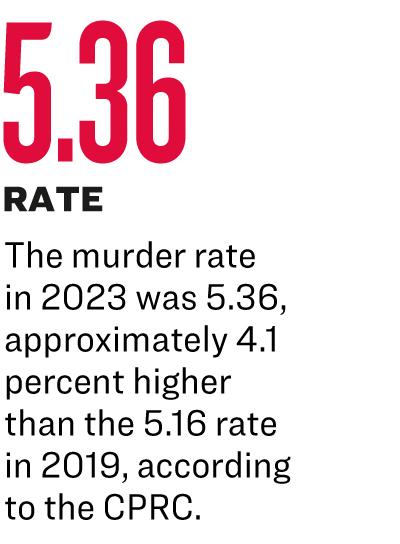
According to the National Association for Gun Rights, 27 states now allow so-called “Constitutional carry,” the carrying of firearms without a license. So, criminals in those states know their intended victims are more likely to be armed than previously had been the case.
Between 2019 and 2023, 14 states adopted Constitutional carry laws. Six of those states, Alabama, Ohio, Indiana, Nebraska, Florida, and Georgia, adopted Constitutional carry in 2022.
“I don’t think [the BSCA] has had much impact other than to provide [President Biden] with talking points,” Mr. Gottlieb told The Epoch Times.
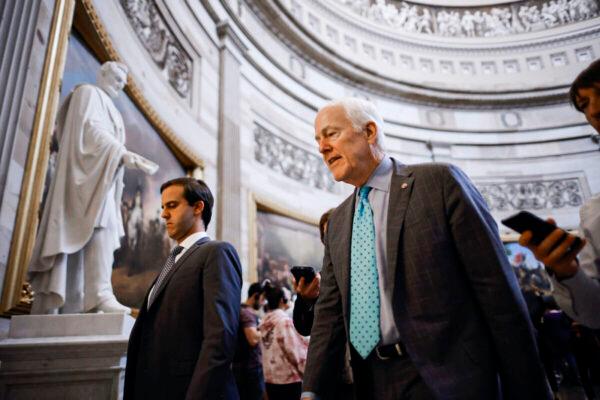
In addition, changes in how the FBI gathers crime data means that fewer police departments reported data for 2021 and 2022, including those in some of the nation’s largest cities such as Los Angeles and New York.
The FBI said that in 2022, 15,724 agencies submitted data out of the 18,884 eligible “state, county, city, university and college, and tribal agencies.”
Republicans who supported the BSCA promised the law would address violent crime without infringing on the rights of law-abiding gun owners.
Sen. John Cornyn (R-Texas) took heat for helping broker the deal with Democrats. In a Jan. 2 email to The Epoch Times, Mr. Cornyn’s press secretary, Tatum Wallace, wrote that the senator stands by his decision.
“Since the Bipartisan Safer Communities Act became law in June 2022, Texas colleges, universities, school districts, and community organizations have received nearly $40 million for school safety, community violence prevention, and mental health resources,” Ms. Wallace said.
In addition, she wrote that the BSCA has led to nearly 20 indictments of violent offenders in jurisdictions across the country and provided $200 million in new Byrne JAG formula grant funding for crisis intervention programs, mental health courts, veterans treatment programs, and drug treatment courts.
“Every state, including states with Republican governors, has accepted this funding pursuant to an implementation plan,” Ms. Wallace wrote.
In September 2023, barely 16 months after the BSCA was signed, Mr. Cornyn and 16 other senators were criticizing a decision by Education Secretary Miguel Cardona to cut funding for archery and hunter safety programs in public schools to comply with the BSCA. According to a letter signed by Mr. Cornyn and 16 other senators, Mr. Cardona misread the law.
In response to Mr. Cardona’s decision, Mr. Cornyn, Sen. Kyrstyn Sinema (I-Ariz.), and Sen. Thom Tillis (R-N.C.) introduced the Protecting Hunting Heritage and Education Act to clarify that students may have programs and activities such as archery and hunting safety education under the BSCA.
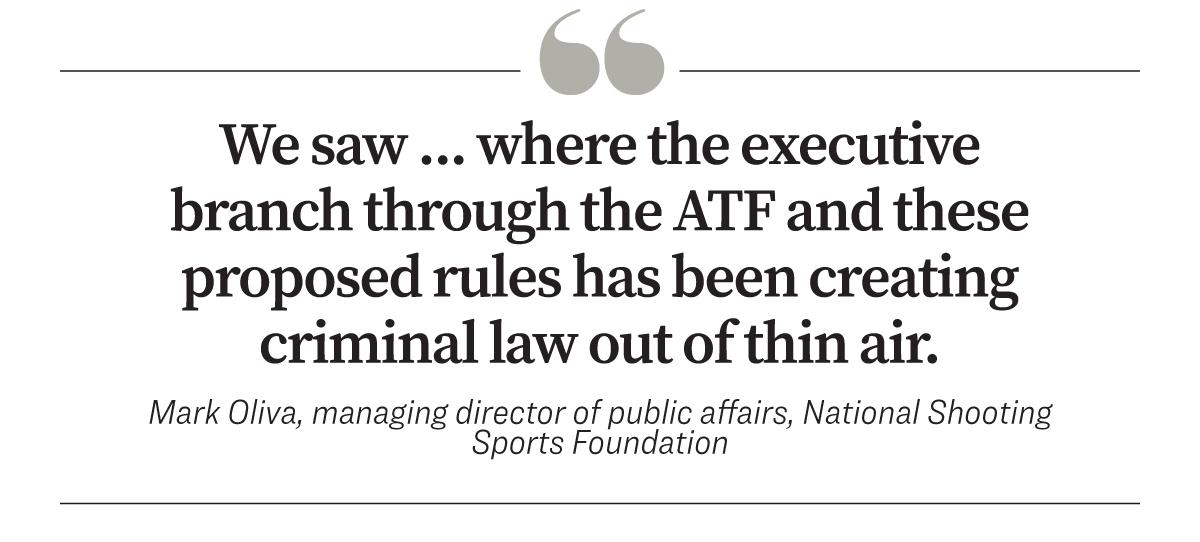
“The Biden Administration’s partisan interpretation of BSCA to eliminate hunting education in schools is a slap in the face to millions of Americans, particularly in rural areas, and discourages bipartisan cooperation in Congress,” Mr. Tillis wrote in a Sept 19, 2023, statement.
The Second Amendment advocates who spoke with The Epoch Times say the BSCA is nothing more than a cudgel to force a gun control agenda.
Mr. Oliva pointed to the ATF’s new rule to redefine what it means to be “engaged in the business” of dealing in firearms. He said the change is an attempt to increase government regulatory authority without Congressional approval.
“That is well beyond the definition that Congress authorized,” Mr. Oliva said. “The executive branch, through the ATF and these proposed rules, has been creating criminal law out of thin air.”
President Biden issued 21 executive orders under the umbrella of the BSCA within a month of the law being enacted, according to the White House website.
“So, I set out to take as much executive action, that’s a fancy way of saying, ‘What can I do as president on my own?’” the president said at the National Safer Communities Summit on June 16, 2023, on the first anniversary of the BSCA.
A Gun Control Wish List
The president outlined some of those executive orders during his speech at the summit. They are straight from the gun control movement’s wish list.
They include outlawing stabilizing pistol braces, which President Biden said converts a firearm so “you can have a higher caliber bullet coming out of that gun.”
A stabilizing pistol brace doesn’t change the caliber of the firearm. The ATF’s pistol brace ban is set to be argued before the U.S. Supreme Court sometime this year.
President Biden also vowed to push for universal background checks for all firearms purchases, zero tolerance for gun dealers that “willfully violate” ATF rules, red-flag laws to disarm people who are subject to protective orders, and restrictions on homemade firearms or guns built from kits, the so-called “ghost guns.”
President Biden said he has issued more executive orders than his predecessors, and the BSCA has provided him the political imprimatur to take action.
“They’re being challenged in court, but so far, so good,” he told the gathering.
One of the most controversial edicts pushed by the administration and the ATF is a proposal to allow lawsuits against gun makers whose products are used in crimes.
“I didn’t know, 10 years ago, that gun manufacturers were immune from liability. Just imagine how many more people would be dead if the tobacco industry was immune from liability,” President Biden said.
Currently, gun manufacturers can be held liable for faulty products or bad business practices, just like any business. President Biden wants to repeal a 2005 law, Protecting Lawful Commerce in Arms Act, to make gunmakers responsible for the criminal use of a firearm.
Mr. Oliva said the repeal of the 2005 law would be the key to throttling all Americans’ Second Amendment rights.
“We are the industry that provides the means for people to be able to exercise their constitutional Second Amendment rights. After attacking the industry, he’s going after those people who want to exercise their Second Amendment right,” he said.
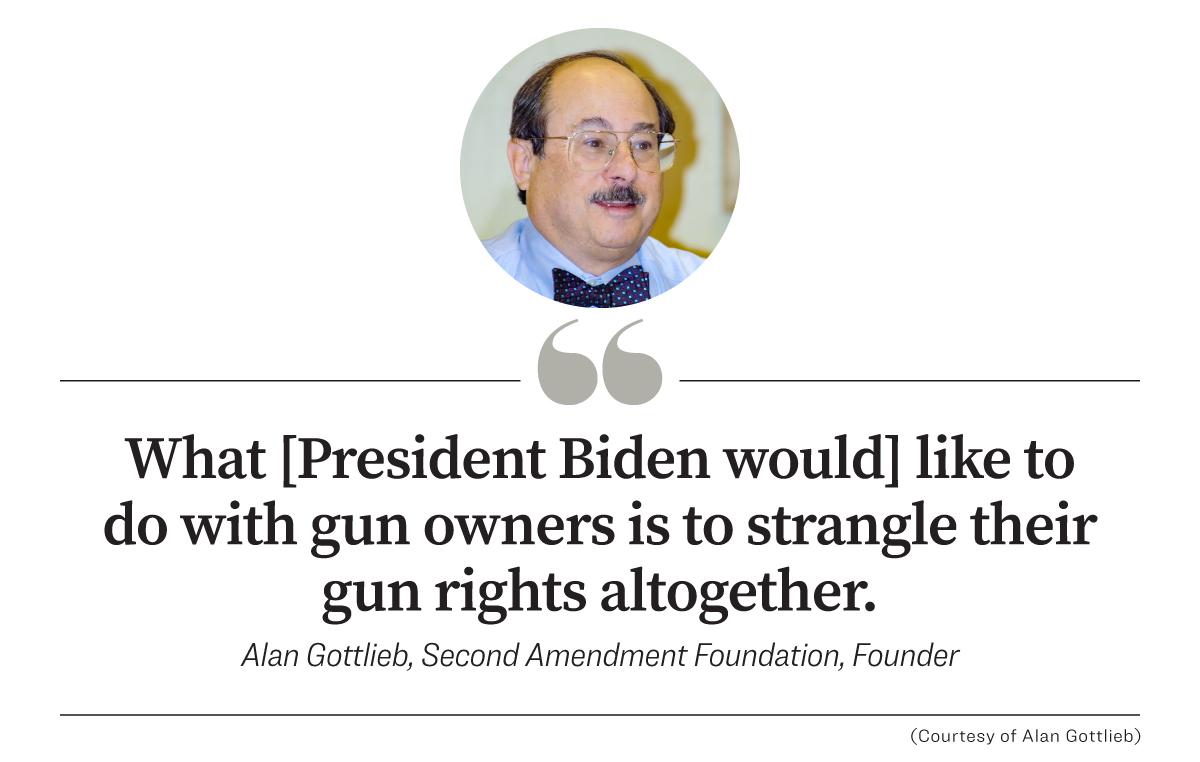
Mr. Gottlieb agrees.
“What [President Biden would] like to do with gun owners is to strangle their gun rights altogether,” he told The Epoch Times.
He said the Second Amendment Foundation is involved in 57 active lawsuits and is considering filing or joining several others. He said his organization has recorded some successes.
“We had 12 significant wins this year,” Mr. Gottlieb said.
The group’s list of successful lawsuits contains some high-profile cases, such as the challenge to the ATF’s rule on stabilizing pistol braces, challenges to “assault” weapons bans in California and Illinois, and a rule by the ATF that classified pistol frames and rifle receivers—neither of which have all the parts needed to fire bullets—as firearms.
All the lawsuits are listed as active because they have either been remanded back to lower courts or are being appealed.
Mr. Gottlieb said gun control politicians will continue to introduce laws and policies they know won’t pass constitutional muster to create a legal quagmire. Lawsuits can take years to make it through the courts, leaving law-abiding gun owners subject to de-facto gun control.
“It takes time to get there. A right delayed is a right denied,” he said.
The top four issues he expects gun control proponents to focus on are widening the laws that designate places in which it’s illegal to carry a firearm, so-called “sensitive places,” expanded background checks for 18- to 20-year-olds, bans on “assault weapons,” and bans on magazines that hold more than a certain number of rounds.
All four have been the subject of lawsuits that Mr. Gottlieb expects to be ultimately decided by the U.S. Supreme Court.
The head of one gun rights group expects the BSCA to be a factor in the gun rights debate for a long time.
“We’re only just seeing the beginning effects of the law,” said Dudley Brown, president of the National Association for Gun Rights (NAGR).
“If anything, it’s a crime against Americans by denying them their Second Amendment rights,” Mr. Brown said.
Gun control advocates have also been busy going through the normal legislative process. The NAGR webpage includes a page that tracks legislation. It currently lists more than 40 bills the group opposes.
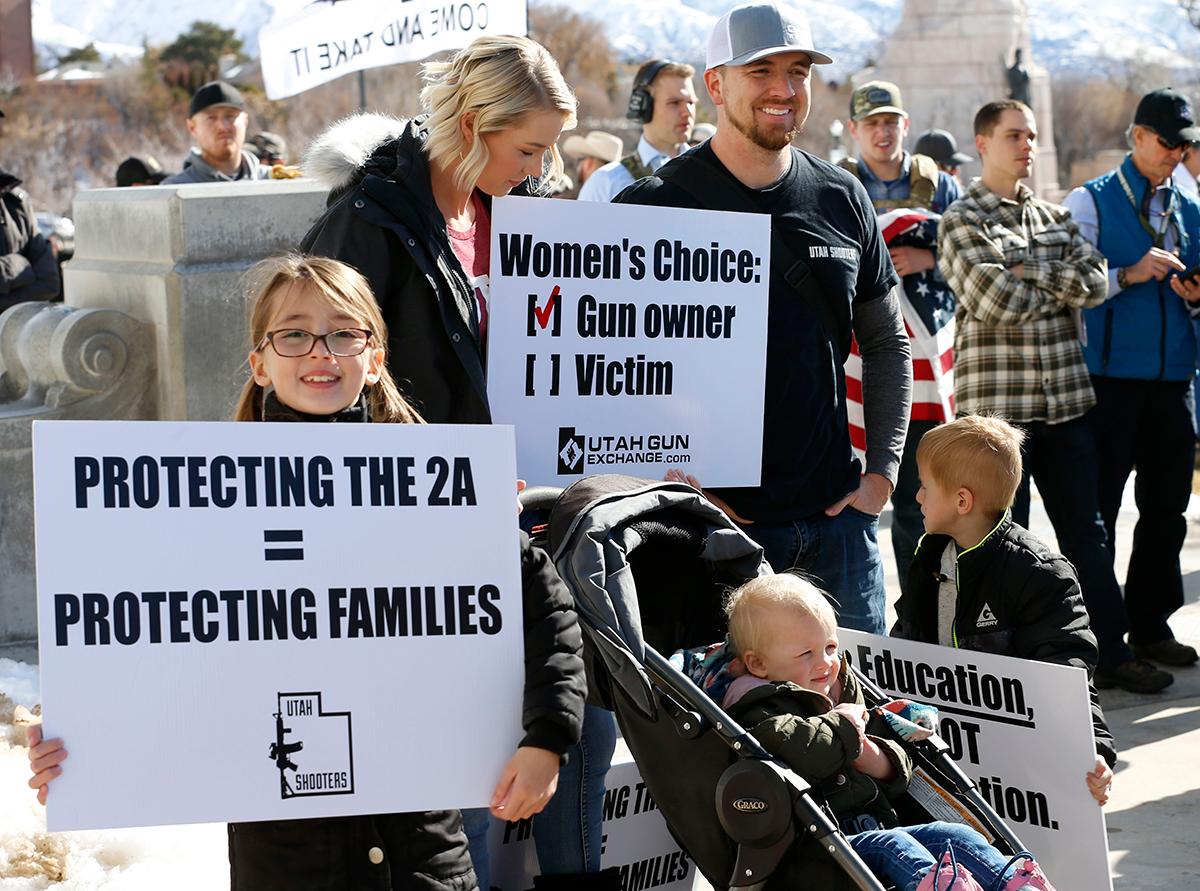
Many of the smaller measures have been packaged into a larger piece of legislation introduced by Sen. Elizabeth Warren (D-Mass.).
A form of the “Gun Violence Prevention and Community Safety Act of 2023” has been introduced in Congress during each session since at least 2015. Ms. Warren reintroduced the bill in the Senate on Dec. 6, 2023.
The bill would require Americans to obtain a federal or state-issued license to buy or own firearms. It would also set firearms and magazine bans along with red flag laws, universal background checks, and other restrictions.
Mr. Brown said that while Democrats appear to be the prime movers behind gun control in Congress, the first word in the law is “Bipartisan.”
“My biggest concerns are the Republicans that are complying with [the BSCA],” he said. “It’s those who pretend they are for your constitutional rights, but in reality, they are just selling you down the river.”
Gun Law Attached to NDAA
Aidan Johnston, director of federal affairs for Gun Owners of America, said that not all gun control laws are passed in the open. Mr. Johnston said his group was able to stop a 1980s-era gun law from being made permanent as part of the latest National Defense Authorization Act (NDAA).
“They were trying to place a controversial piece of gun legislation in a must-pass legislation,” he told The Epoch Times.
According to Mr. Johnston, the Undetectable Firearms Act of 1988 was written when polymer-framed pistols began entering the market in the 1980s. At the time, there was some concern that criminals could sneak the guns through metal detectors. So, the act required that pistols contain a certain amount of steel.
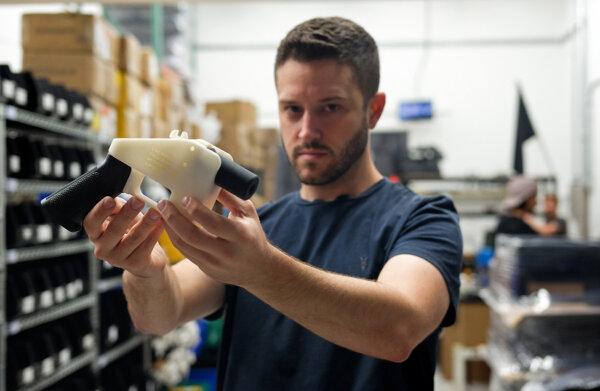
The law had a sunset provision and was renewed for five years in 1998. Congress renewed it for 10 years in 2003 and 2013 but allowed it to expire last month. However, a new version was introduced in the U.S. House of Representatives on June 15, 2023. The new bill is titled the Undetectable Firearms Modernization Act.
Mr. Johnston pointed out that metal detectors are no longer the only way to find hidden firearms. He said millimeter wave scanners and other devices can detect objects regardless of what they are made of. He is concerned the law would be used to regulate the use of 3D printing in the manufacture of guns.
The new proposal could stifle new technology while doing little to prevent the proliferation of illegal guns, Mr. Johnston said.
“There’s no real threat to the public posed by these firearms,” he said.
Almost 18 months after the BSCA was signed into law, the administration is taking its principles and methods to the states to encourage them to implement BSCA-style laws.
On Dec. 13, 2023, Vice President Kamala Harris and representatives from the offices of Gun Violence Prevention and Intergovernmental Affairs met with more than 100 state leaders to promote the administration’s “Safer States Initiative.”
“Today, Vice President Harris is launching the Biden-Harris administration’s Safer States Initiative to provide states with additional tools and the support they need to reduce gun violence and save lives,” a White House fact sheet states.
The eight-page plan calls on states to adopt their own versions of laws and executive orders enacted or proposed by federal officials.
These include banning certain types of ammunition magazines and semi-automatic rifles, enacting or expanding red flag laws, requiring universal background checks, making it easier to sue gun makers, and starting their own offices of gun violence prevention modeled on the recently created White House Office on Gun Violence Prevention.
Mr. Brown said it’s up to gun owners to address the gun control movement head-on.
“We should be fighting this in the legislatures.”

